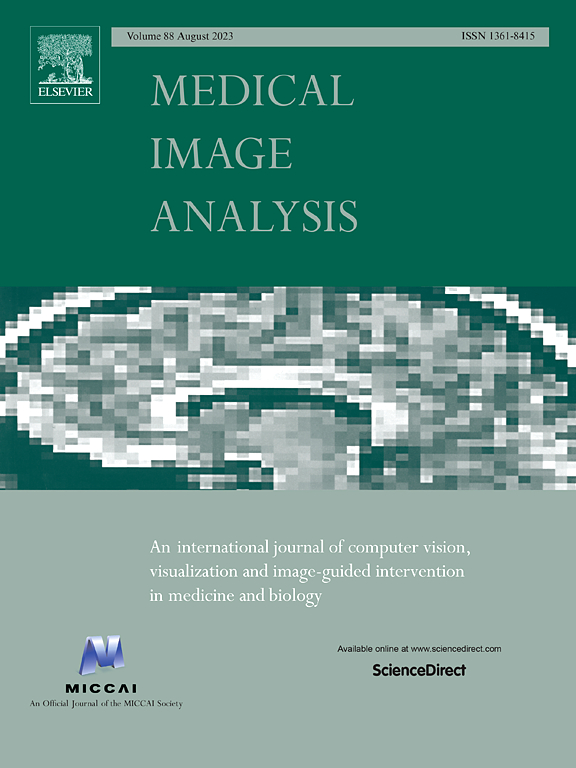FedBM: Stealing knowledge from pre-trained language models for heterogeneous federated learning
IF 10.7
1区 医学
Q1 COMPUTER SCIENCE, ARTIFICIAL INTELLIGENCE
引用次数: 0
Abstract
Federated learning (FL) has shown great potential in medical image computing since it provides a decentralized learning paradigm that allows multiple clients to train a model collaboratively without privacy leakage. However, current studies have shown that data heterogeneity incurs local learning bias in classifiers and feature extractors of client models during local training, leading to the performance degradation of a federation system. To address these issues, we propose a novel framework called Federated Bias eliMinating (FedBM) to get rid of local learning bias in heterogeneous federated learning (FL), which mainly consists of two modules, i.e., Linguistic Knowledge-based Classifier Construction (LKCC) and Concept-guided Global Distribution Estimation (CGDE). Specifically, LKCC exploits class concepts, prompts and pre-trained language models (PLMs) to obtain concept embeddings. These embeddings are used to estimate the latent concept distribution of each class in the linguistic space. Based on the theoretical derivation, we can rely on these distributions to pre-construct a high-quality classifier for clients to achieve classification optimization, which is frozen to avoid classifier bias during local training. CGDE samples probabilistic concept embeddings from the latent concept distributions to learn a conditional generator to capture the input space of the global model. Three regularization terms are introduced to improve the quality and utility of the generator. The generator is shared by all clients and produces pseudo data to calibrate updates of local feature extractors. Extensive comparison experiments and ablation studies on public datasets demonstrate the superior performance of FedBM over state-of-the-arts and confirm the effectiveness of each module, respectively. The code is available at https://github.com/CUHK-AIM-Group/FedBM.
FedBM:从预训练的语言模型中窃取知识,用于异构联邦学习
联邦学习(FL)在医学图像计算中显示出巨大的潜力,因为它提供了一种分散的学习范式,允许多个客户端在不泄露隐私的情况下协同训练模型。然而,目前的研究表明,数据异质性会导致客户模型的分类器和特征提取器在局部训练过程中产生局部学习偏差,从而导致联邦系统的性能下降。为了解决这些问题,我们提出了一种新的框架,称为联邦偏差消除(FedBM)来消除异构联邦学习(FL)中的局部学习偏差,该框架主要由两个模块组成,即基于语言知识的分类器构建(LKCC)和概念引导的全局分布估计(CGDE)。具体来说,LKCC利用类概念、提示符和预训练语言模型(plm)来获得概念嵌入。这些嵌入用于估计每个类在语言空间中的潜在概念分布。在理论推导的基础上,我们可以依靠这些分布为客户端预构建一个高质量的分类器来实现分类优化,并将其冻结以避免局部训练时的分类器偏差。CGDE从潜在概念分布中抽取概率概念嵌入样本,学习一个条件生成器来捕获全局模型的输入空间。为了提高发电机的质量和实用性,引入了三个正则化项。该生成器由所有客户端共享,并生成伪数据来校准本地特征提取器的更新。在公共数据集上进行的大量对比实验和烧蚀研究表明,FedBM的性能优于最先进的技术,并分别证实了每个模块的有效性。代码可在https://github.com/CUHK-AIM-Group/FedBM上获得。
本文章由计算机程序翻译,如有差异,请以英文原文为准。
求助全文
约1分钟内获得全文
求助全文
来源期刊

Medical image analysis
工程技术-工程:生物医学
CiteScore
22.10
自引率
6.40%
发文量
309
审稿时长
6.6 months
期刊介绍:
Medical Image Analysis serves as a platform for sharing new research findings in the realm of medical and biological image analysis, with a focus on applications of computer vision, virtual reality, and robotics to biomedical imaging challenges. The journal prioritizes the publication of high-quality, original papers contributing to the fundamental science of processing, analyzing, and utilizing medical and biological images. It welcomes approaches utilizing biomedical image datasets across all spatial scales, from molecular/cellular imaging to tissue/organ imaging.
 求助内容:
求助内容: 应助结果提醒方式:
应助结果提醒方式:


